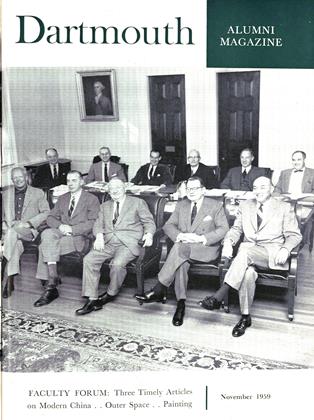IF last year's Dartmouth College freshmen had it to do over again, their secondary-school preparation would include:
1. A more extensive reading program.
2. More work in foreign languages, especially in the final year.
3. More preparation in English composition.
These are some of the results obtained in a questionnaire survey of more than two-thirds of Dartmouth's 771-man Class of 1962 made at the end of their freshman year. The survey was prepared and compiled by the Office of Admissions. It sought data from the students themselves to be used in counseling prospective students and to assist secondary-school administrators in college guidance and curriculum planning.
The survey also revealed that, despite the post-sputnik concern about secondaryschool training in mathematics and science, the freshmen felt that these subjects provided the strongest preparatory work they had had. Thirty-one per cent felt that they had been best prepared in mathematics, 26 per cent in English, 18 per cent in science, 13 per cent in history, 11 per cent in foreign languages, and one per cent in social studies.
The study also revealed a need for more and better guidance and college placement services in many schools. Although not subject to tabulation, the comments included: "Counseling did not begin early enough. Students are not conscious of the prerequisites required by colleges until it is usually too late." "Our counselor was adviser, math teacher and registrar, excellent at all three, but much too pressed for time." "All the guidance I got came from alumni of the various schools."
Reading requirements in secondary schools were generally considered inadequate for college. Fifty-six per cent felt this preparation was fair or poor, while only 17 per cent considered it excellent. Of those who graduated from public high schools (72 per cent of those surveyed) 68 per cent wished the reading requirements had been more demanding. Privateschool graduates were happier with their programs. Seventy-six per cent felt that they had had excellent or above-average preparation in this area.
In foreign-language study, 52 per cent felt more years would have been desirable. Thirty-six per cent felt their background was ample and 12 per cent were uncertain. More emphatic were the findings on the advisability of continuing the study through the final year. A solid 65 per cent said "definitely yes"; another 24 per cent felt it "probably would have been desirable," while only 11 per cent were uncertain or negative.
Questions concerning the subjects in which they had had the best and worst preparation produced a seeming paradox. English led the list of subjects considered "weakest" with 32 per cent; sciences were second with 18 per cent, and math third with 13 per cent. On the other hand, among subjects that provided the strongest preparation, English was second only to math among the six listed.
"Apparently most of the students felt strongly, one way or another, about their English preparation," Edward T. Chamberlain '36, director of admissions, said.
In answering the specific question: "How well do you feel you were prepared . . . in the general area of English composition?" 44 per cent rated it "fair to good," 30 per cent "very good," 22 per cent "poor," and 4 per cent "very poor."
 View Full Issue
View Full Issue
More From This Issue
-
 Feature
FeatureOur Place in the Sky
November 1959 By PROF. MILLETT G. MORGAN, -
 Feature
FeatureCan Chinese Civilization Survive Communism?
November 1959 By WING-TSIT CHAN -
 Feature
FeatureSocial Responsibility in Painting
November 1959 By CHARLES T. MOREY, -
 Feature
FeatureThe Commitment of Fellowship
November 1959 By PRESIDENT JOHN SLOAN DICKEY -
 Feature
FeatureSEASONS AND CAESARS
November 1959 By JIM FISHER '54 -
 Feature
FeatureDartmouth and Saint Francis
November 1959 By GORDON M. DAY







